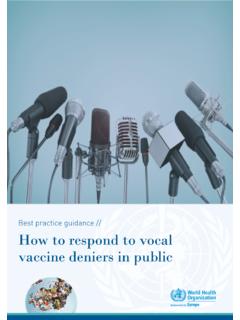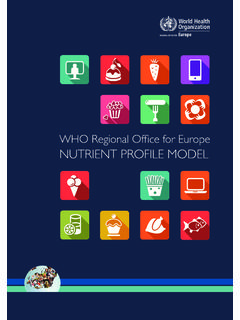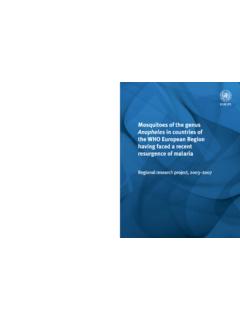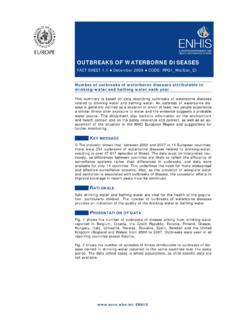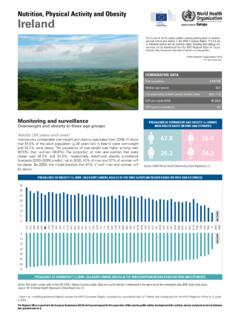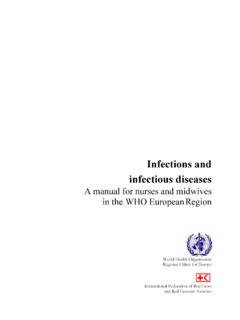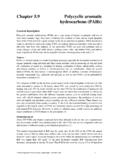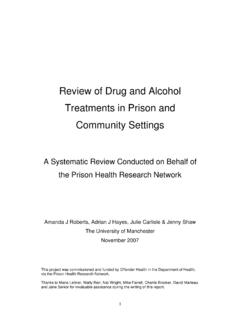Transcription of Prisons and Health - World Health Organization
1 The WHO Regional Office for EuropeThe World Health Organization (WHO) is a specialized agency of the United Nations created in 1948 with the primary responsibility for international Health matters and public Health . The WHO Regional Office for Europe is one of six regional offices throughout the World , each with its own programme geared to the particular Health conditions of the countries it StatesAlbaniaAndorraArmeniaAustriaAzerba ijanBelarusBelgiumBosnia and HerzegovinaBulgariaCroatiaCyprusCzech RepublicDenmarkEstoniaFinlandFranceGeorg iaGermanyGreeceHungaryIcelandIrelandIsra elItalyKazakhstanKyrgyzstanLatviaLithuan iaLuxembourgMaltaMonacoMontenegroNetherl andsNorwayPolandPortugalRepublic of MoldovaRomaniaRussian FederationSan MarinoSerbiaSlovakiaSloveniaSpainSwedenS witzerlandTajikistanThe former Yugoslav Republic of MacedoniaTurkeyTurkmenistanUkraineUnited KingdomUzbekistan9789289050593>ISBN 978-9-289-05059-3 World Health Organization Regional Office for EuropeUN City, Marmorvej 51.
2 DK-2100 Copenhagen , DenmarkTel.: +45 45 33 70 00. Fax: +45 45 33 70 01. E-mail: site: and HealthPrisons and HealthPrisons and HealthEdited by: Stefan Enggist, Lars M ller, Gauden Galea and Caroline Udesen2 Prisons and Health World Health Organization 2014 All rights reserved. The Regional Office for Europe of the World Health Organization welcomes requests for permission to reproduce or translate its publications, in part or in designations employed and the presentation of the material in this publication do not imply the expression of any opinion whatsoever on the part of the World Health Organization concerning the legal status of any country, territory, city or area or of its authorities, or concerning the delimitation of its frontiers or boundaries. Dotted lines on maps represent approximate border lines for which there may not yet be full mention of specific companies or of certain manufacturers products does not imply that they are endorsed or recommended by the World Health Organization in preference to others of a similar nature that are not mentioned.
3 Errors and omissions excepted, the names of proprietary products are distinguished by initial capital reasonable precautions have been taken by the World Health Organization to verify the information contained in this publication. However, the published material is being distributed without warranty of any kind, either express or implied. The responsibility for the interpretation and use of the material lies with the reader. In no event shall the World Health Organization be liable for damages arising from its use. The views expressed by authors, editors, or expert groups do not necessarily represent the decisions or the stated policy of the World Health book outlines important suggestions by international experts to improve the Health of those in prison and to reduce both the Health risks and risks to society of imprisonment.
4 In particular, it aims to facilitate better prison Health practices in the fields of: (i) human rights and medical ethics, (ii) communicable diseases, (iii) noncommunicable diseases, (iv) oral Health , (v) risk factors, (vi) vulnerable groups and (vii) prison Health management. It is aimed at professional staff at all levels of responsibility for the Health and well-being of detainees and at people with political responsibility. The term prison covers all institutions where a state holds people deprived of their liberty. KeywordsHEALTHCARE SYSTEMSHUMAN RIGHTSMEDICAL ETHICSPREVENTIONPRISONERSPRISONSVIOLENCE A ddress requests about publications of the WHO Regional Office for Europe to: Publications WHO Regional Office for Europe UN City, Marmorvej 51 DK-2100 Copenhagen , DenmarkAlternatively, complete an online request form for documentation, Health information, or for permission to quote or translate, on the Regional Office web site ( ).
5 ISBN: 978 92 890 5059 3 Cover: Photo by Maxim Dondyuk, ..viiiAbout the authors ..ixAbbreviations ..xForeword ..xiHuman rights and medical ethics1. The essentials about Prisons and Health ..1 Key points ..1 Background ..1 The duty of care ..1 Why prison Health is important ..2 Difficulties with isolation of services ..2 Essential components of a prison Health service ..3 Good governance for prison Health ..4 References ..42. Standards in prison Health : the prisoner as a patient ..6 Key points ..6 Basic principles ..6 Relationship between the prisoner and Health care staff ..6 Organization of prison Health care ..7 European prison Rules ..8 References ..93. prison -specific ethical and clinical problems ..11 Key points ..11 Introduction ..11 Health care staff in Prisons .
6 11 Disciplinary measures ..13 Physical restraint ..13 Intimate body searches ..13 Prisoners who stop eating or go on hunger strikes ..13 Torture and inhumane or degrading treatment ..16 References ..164. Violence, sexual abuse and torture in Prisons ..19 Key points ..19 Introduction ..19 Definitions of violence in prison ..19 Violence in Prisons ..20 Sexual violence in Prisons ..20 Torture and ill-treatment ..21 Prevention of violence in Prisons ..22 Prisons and Health The role of the prison Health services ..24 References ..245. Solitary confinement as a prison Health issue ..27 Key points ..27 Introduction ..27 What is solitary confinement? ..27 How does solitary confinement affect Health and well-being ..27 Particularly vulnerable groups.
7 29 Long-term effects ..31 When and why is solitary confinement used in contemporary penal systems? ..31 How do international law and human rights bodies view solitary confinement? ..32 Conclusion ..32 References ..336. Health in pre-trial detention ..36 Key points ..36 Introduction ..36 Defining pre-trial detention ..36 Guidelines ..36 Challenges of pre-trial detention ..37 Improving Health conditions at the pre-trial stage ..38 References ..39 Communicable diseases7. HIV and other bloodborne viruses in Prisons ..45 Key points ..45 Introduction ..45 Bloodborne viruses ..45 The issues or challenges within the prison environment ..46 A comprehensive approach ..46 The evidence ..47 Interventions ..47 Nutrition support and diet.
8 53 Continuity of treatment ..53 Palliative care/compassionate release ..54 Quality assurance and monitoring of, and interventions for, HIV and hepatitis C and D ..54 References ..548. TB prevention and control care in Prisons ..56 Key points ..56 Introduction ..56 Transmission ..57 Case-finding ..58 Contents Screening strategies ..58 Clinical features of TB ..61 Treatment ..63 MDR-TB ..64 TB/HIV co-infection ..66 TB infection control ..68 Advocacy, communication and social mobilization ..69 Continuum of care for released prisoners ..70 References ..719. Infectious diseases in prison ..73 Key points ..73 Introduction ..73 Influenza ..73 Measles, mumps and rubella ..74 Viral hepatitis ..74 Tetanus.
9 74 Diphtheria ..75 Sexually transmitted infections ..75 Ectoparasites ..76 Vaccination, quarantine and personal hygiene ..76 References ..77 Noncommunicable diseases10. Noncommunicable diseases and prisoners ..81 Key points ..81 Introduction ..81 Burden of disease and risk factors for NCDs in prisoners ..81 Challenges in providing appropriate prevention and care to prisoners ..82 References ..8411. Mental Health in prison ..87 Key points ..87 Introduction ..87 Human and prisoners rights and basic needs ..87 Equivalence ..88 Prevalence of poor mental Health ..88 Complexity and multiple needs ..88 Illness and social focus ..89 The impact of prison on mental Health and well-being ..89 Prisoners views of their needs.
10 89 Prisoners views on what constitutes a good mental Health service ..90 Mental Health awareness in the prison system ..90 Prisons and Health Prisoners and their families ..90 Diagnosis and assessment ..91 Screening and assessment ..91 Treatment in prison ..91 Personality disorders ..92 Continuity of care ..92 Meeting the needs of different groups in the prison population ..92 The recovery approach ..93 The roles of peers and mentors ..93 Diversion and liaison ..94 References ..94 Oral health12. Dental Health in Prisons ..99 Key points ..99 Introduction ..99 Oral Health ..99 General impact of general Health on oral Health ..99 Utilization of the prison dental service ..99 Provision of prison dental services ..100 Accessibility of dental services ..100 Good clinical practice.


